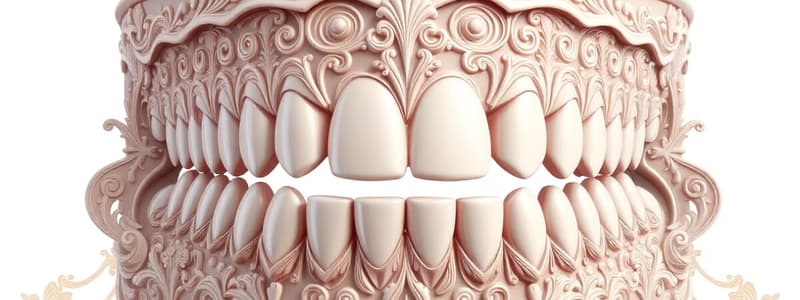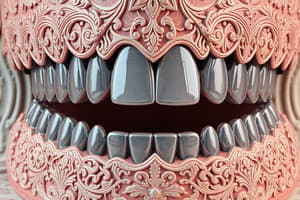Podcast
Questions and Answers
What is the approximate width of occlusal rims in the anterior region?
What is the approximate width of occlusal rims in the anterior region?
- 4–6 mm
- 10–12 mm
- 6–8 mm (correct)
- 8–10 mm
What is the primary purpose of occlusion rims?
What is the primary purpose of occlusion rims?
- To replace missing teeth
- To align the jaw relationships (correct)
- To support the bite registration
- To determine the size of the denture base
Where should the labial surface of the maxillary occlusion rim be positioned in relation to the incisive papilla?
Where should the labial surface of the maxillary occlusion rim be positioned in relation to the incisive papilla?
- Approximately 6–8 mm anterior to the incisive papilla (correct)
- Approximately 10–12 mm posterior to the incisive papilla
- At the middle of the incisive papilla
- Approximately 4–6 mm anterior to the incisive papilla
What height should the anterior portion of the mandibular occlusion rim be approximately?
What height should the anterior portion of the mandibular occlusion rim be approximately?
What aspect should be continuously communicated to patients regarding record bases and occlusion rims?
What aspect should be continuously communicated to patients regarding record bases and occlusion rims?
What is the approximate width of posterior occlusion rims?
What is the approximate width of posterior occlusion rims?
Which line on the occlusion rim helps to determine the width of the artificial teeth?
Which line on the occlusion rim helps to determine the width of the artificial teeth?
What is the height of the posterior lower region of the mandibular occlusion rim related to?
What is the height of the posterior lower region of the mandibular occlusion rim related to?
What is the primary purpose of using occlusion blocks?
What is the primary purpose of using occlusion blocks?
Which requirement for a trial denture base ensures that it does not distort over time?
Which requirement for a trial denture base ensures that it does not distort over time?
What is the purpose of waxing out undercuts on the master casts?
What is the purpose of waxing out undercuts on the master casts?
How long should the cast be soaked in room temperature water before making the record base?
How long should the cast be soaked in room temperature water before making the record base?
Why is a tinfoil substitute used in the process of making the record base?
Why is a tinfoil substitute used in the process of making the record base?
What is the ideal thickness of the trial denture base required?
What is the ideal thickness of the trial denture base required?
What component is essential for making interocclusal records?
What component is essential for making interocclusal records?
Which of the following statements about the construction of the record base is correct?
Which of the following statements about the construction of the record base is correct?
What is a primary function of occlusion blocks in denture construction?
What is a primary function of occlusion blocks in denture construction?
Which requirement is crucial for ensuring a trial denture base can be easily inserted and removed without damaging the cast?
Which requirement is crucial for ensuring a trial denture base can be easily inserted and removed without damaging the cast?
Why is it necessary to soak the cast in water before creating the record base?
Why is it necessary to soak the cast in water before creating the record base?
What is the recommended method for applying tinfoil substitute to avoid issues during the record base creation?
What is the recommended method for applying tinfoil substitute to avoid issues during the record base creation?
What feature should the dimensions of the trial denture base exhibit to ensure stability during its use?
What feature should the dimensions of the trial denture base exhibit to ensure stability during its use?
During the wax block out process, which areas on the maxillary cast are typically blocked out?
During the wax block out process, which areas on the maxillary cast are typically blocked out?
What is the consequence of not achieving a proper fit for the trial denture base?
What is the consequence of not achieving a proper fit for the trial denture base?
Which characteristic of the record base is essential for its construction using autopolymerizing acrylic resin?
Which characteristic of the record base is essential for its construction using autopolymerizing acrylic resin?
What is the primary reason for the thickness variation of the record base?
What is the primary reason for the thickness variation of the record base?
What measurement is crucial for positioning the labial surface of the maxillary occlusion rim?
What measurement is crucial for positioning the labial surface of the maxillary occlusion rim?
What is the recommended width of the occlusal rim in the posterior region?
What is the recommended width of the occlusal rim in the posterior region?
Which aspect of occlusion rims aids in establishing the midline during prosthetic preparation?
Which aspect of occlusion rims aids in establishing the midline during prosthetic preparation?
Which detail must be communicated to patients about record bases and occlusion rims?
Which detail must be communicated to patients about record bases and occlusion rims?
What is the vertical height of the mandibular occlusion rim approximately supposed to be?
What is the vertical height of the mandibular occlusion rim approximately supposed to be?
What should the distance between the canine line and the posterior end of the occlusion rim determine?
What should the distance between the canine line and the posterior end of the occlusion rim determine?
Why is it important that occlusion rims provide support for lip and cheeks?
Why is it important that occlusion rims provide support for lip and cheeks?
Flashcards are hidden until you start studying
Study Notes
Record Bases and Occlusion Blocks
-
Definition: Occlusion blocks are composed of occlusion rims attached to well-fitting trial denture bases.
-
Purpose:
- Establishing facial contours
- Assisting in tooth selection
- Maintaining the vertical dimension of occlusion during record taking
- Making interocclusal records
- Arranging denture teeth
- Creating a waxed-up mold for the external surface of the complete denture
Requirements of a Trial Denture Base
- Characteristics:
- Rigid
- Accurately adapted to the cast with proper extensions
- Dimensionally stable with minimal warpage
- Relieved from undercuts to avoid scraping the cast
- Clean and smooth for patient comfort
- Proper and uniform thickness (2mm)
- Easy to construct
Wax Blockout
- Purpose: To protect master casts from tissue undercuts and irregularities.
- Locations:
- Maxillary casts: Labial of the anterior ridge, rugae areas, sometimes in tuberosity areas laterally.
- Mandibular cast: Retromylohyoid areas.
Record Base Fabrication
- Master Cast Preparation:
- The cast is soaked in room temperature water for 5 minutes to expel air and minimize bubble-like defects.
- A tinfoil substitute is used as a separating medium to protect the cast and ensure separation of the record base.
- The tinfoil substitute is applied in two thin layers, allowing the first layer to dry before applying the second.
- Record Base Material:
- Fabricated with autopolymerizing acrylic resin.
- Thickness:
- Thinner on the crest of the ridges and buccal to the crest of the ridges due to limited space for tooth arrangement.
Occlusion Rims
- Material: Generally made of pink modeling wax.
- Uses:
- Registration of jaw relationships
- Tooth selection:
- Midline determination
- High and low lip line determination for tooth length
- Canine line determination for tooth width
- Distance between the canine line and posterior end of the occlusion rim for posterior tooth width
- Setting up teeth
- Support for lips and cheeks
Occlusion Rim Dimensions
- Width:
- Approximately 8–10 mm in the posterior region
- 6–8 mm in the anterior region
- Maxillary Occlusion Rim:
- Labial surface in the central area is approximately 6-8 mm anterior to the middle of the incisive papilla and is inclined labially.
- Mandibular Occlusion Rim:
- Vertical height is about 18mm.
- Posterior lower region height is equal to two-thirds the height of the retromolar pad (middle to upper third).
Important Considerations
- Patient Communication: Continuously inform patients that the record bases and occlusion rims are not permanent parts of the dentures and may feel loose due to blocked-out undercuts.
Record Bases and Occlusion Blocks
- Occlusion blocks consist of occlusion rims attached to well-fitting trial denture bases
- Purpose of record bases and occlusion rims:
- Establish facial contours
- Aid in tooth selection
- Establish and maintain the vertical dimension of occlusion during records making
- Making interocclusal records
- Arrangement of the denture teeth
- Waxed-up mold for the external surface of the complete denture
Requirements of Trial Denture Bases
- Must be:
- Rigid
- Accurately adapted to the cast with proper extensions
- Dimensionally stable with minimal warpage
- Relieved from any undercuts to avoid scraping the cast during insertion and removal
- Clean & smooth for patient comfort
- Proper & uniform thickness (2mm)
- Easy to construct
Wax Block Out
- Protect master casts by blocking out tissue undercuts and irregularities with base plate wax
- Maxillary casts are blocked out in locations such as:
- Labial of the anterior ridge
- Rugae areas
- Sometimes in the tuberosity areas laterally
- Mandibular casts are blocked out in the retromylohyoid areas
Preparing the Cast for Record Base Fabrication
- The cast is soaked in room temperature water for 5 minutes to expel air from within the stone and minimize bubble-like defects
- Tinfoil substitute is used as a separating medium applied in two thin layers to protect the cast and allow separation of the record base
Fabricating the Record Base
- Fabricated with autopolymerizing acrylic resin
- Thinner on the crest of the ridges and buccal to the crest of the ridges to allow for space during tooth arrangement
Occlusion Rim Fabrication
- Generally made of pink modeling wax
- Uses:
- Registration of jaw relationships
- Choice of artificial teeth:
- Midline is determined
- High and low lip lines are determined, indicating tooth length
- Canine lines are used to determine tooth width
- Distance between canine line and the posterior end of the occlusion rim determines the mesiodistal width of posterior teeth.
- Setting-up of teeth
- Support for lip and cheeks
Width and Dimensions of Occlusion Rims
- Posterior: 8-10 mm in width
- Anterior: 6-8 mm in width
- Maxillary:
- Labial surface in the central area is approximately 6-8 mm anterior to the middle of the incisive papilla, inclined labially
- Mandibular:
- Vertical height is about 18 mm
- Posterior height represents two-thirds the height of the retromolar pad (middle to upper third)
Important Considerations
- Continuously inform patients that record bases and occlusion rims are not part of the completed dentures and may feel loose due to blocked-out undercuts
Studying That Suits You
Use AI to generate personalized quizzes and flashcards to suit your learning preferences.




